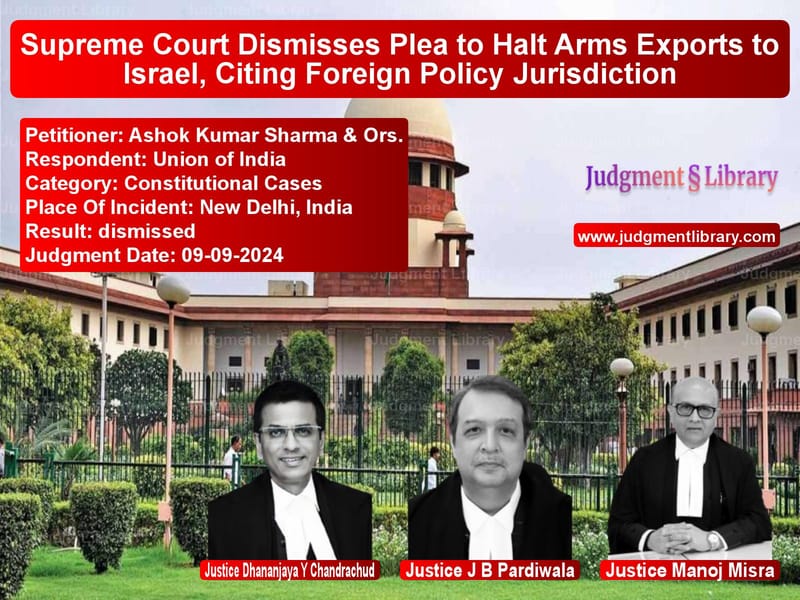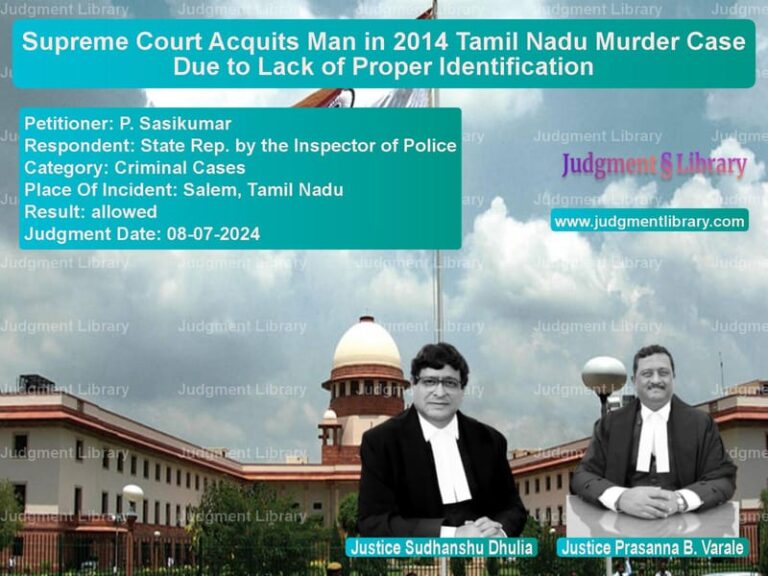Supreme Court Dismisses Plea to Halt Arms Exports to Israel, Citing Foreign Policy Jurisdiction
The case of Ashok Kumar Sharma & Ors. vs. Union of India involved a petition under Article 32 of the Constitution, seeking the cancellation of existing licenses and a prohibition on new licenses for the export of arms and military equipment to Israel amid the ongoing conflict in Gaza. The Supreme Court, in its judgment dated September 9, 2024, dismissed the petition, ruling that foreign policy matters lie exclusively within the domain of the Union Government and are not subject to judicial intervention.
The case raised significant questions about India’s international obligations, constitutional provisions related to foreign policy, and the judiciary’s role in matters of geopolitical significance.
Background of the Case
The petitioners, comprising former civil servants, scholars, activists, and human rights advocates, argued that India’s continued export of arms to Israel during the ongoing Gaza conflict violated India’s international legal obligations and fundamental rights under the Constitution.
The petition specifically sought:
- The immediate cancellation of all existing arms export licenses to Israel.
- A prohibition on granting new licenses for the sale of military equipment to Israel.
- A judicial directive to ensure India complies with its obligations under international treaties that prohibit the supply of arms to countries accused of war crimes or genocide.
Legal Framework and Arguments
Petitioners’ Arguments
Represented by Senior Advocate Prashant Bhushan, the petitioners contended:
- India is a signatory to various international treaties, including the Genocide Convention, which obligates it to prevent aiding or abetting war crimes.
- The International Court of Justice (ICJ) has raised concerns over Israel’s actions in Palestine, and India’s export of arms to Israel makes it complicit.
- Under Articles 14, 21, and 51(c) of the Indian Constitution, India must uphold the rule of law and respect international commitments.
- Arms trade decisions, while primarily an executive function, should not violate constitutional morality or India’s commitment to global peace.
Respondent’s (Union of India) Arguments
The Union Government countered the petition by arguing:
- Foreign policy decisions fall strictly under the purview of the executive and are governed by Article 73 of the Constitution.
- Under Article 253, only Parliament has the authority to implement international treaties through legislation, and courts cannot direct executive policy in such matters.
- India’s defense trade with foreign nations, including Israel, is based on strategic, economic, and geopolitical considerations.
- Prohibiting arms exports through a judicial order would interfere with India’s international relations and could harm national interests.
Supreme Court’s Observations
The Supreme Court, led by Chief Justice Dr. Dhananjaya Y Chandrachud and Justices J B Pardiwala and Manoj Misra, examined whether the court could intervene in a matter of foreign policy and defense trade.
Key Findings
- The Court acknowledged that international law forms part of domestic law unless excluded by parliamentary legislation. However, it clarified that the enforcement of such treaties remains a function of the executive.
- Judicial intervention in foreign policy matters would require the Court to make a determination on Israel’s conduct in Gaza, over which it has no jurisdiction.
- Canceling existing arms export licenses would breach international contracts and could subject Indian defense companies to significant legal and financial liabilities.
- The government already possesses statutory powers under the Foreign Trade (Regulation and Development) Act and the Customs Act, 1962 to regulate arms exports if necessary.
Important Excerpts from the Judgment
“The fundamental objection to the maintainability of the petition lies in the fact that the authority in relation to the conduct of foreign affairs is vested with the Union Government under Article 73 of the Constitution.”
“Absent jurisdiction over a sovereign state, it would be impermissible for this Court to entertain the grant of reliefs of this nature.”
“Judicial restraint in matters of foreign policy is a well-established principle, as courts lack the institutional competence to assess the full ramifications of diplomatic and military decisions.”
Final Judgment
The Supreme Court ruled:
- The petition was not maintainable under Article 32 as it sought intervention in foreign policy decisions.
- The cancellation of arms export licenses is an executive function, not a matter for judicial review.
- Existing Indian laws provide sufficient mechanisms for the government to regulate arms exports if necessary.
- The petition was dismissed, with no judicial directive issued to the government.
Implications of the Judgment
This ruling has several far-reaching implications:
- Reaffirmation of Executive Authority: The judgment reinforces that foreign policy decisions rest solely with the government.
- Judicial Restraint in International Affairs: Courts must avoid intervening in matters involving international treaties, military trade, and diplomatic relations.
- Legal Boundaries of Human Rights Advocacy: While public interest litigations can challenge government actions, courts cannot be used to dictate foreign policy.
- Impact on India’s Defense Trade: The ruling provides clarity to defense manufacturers, ensuring that arms trade agreements remain legally secure.
By dismissing the petition, the Supreme Court has upheld the separation of powers, emphasizing that decisions regarding arms exports, international treaties, and geopolitical strategy are matters best left to the Union Government.
Petitioner Name: Ashok Kumar Sharma & Ors..Respondent Name: Union of India.Judgment By: Justice Dhananjaya Y Chandrachud, Justice J B Pardiwala, Justice Manoj Misra.Place Of Incident: New Delhi, India.Judgment Date: 09-09-2024.
Don’t miss out on the full details! Download the complete judgment in PDF format below and gain valuable insights instantly!
Download Judgment: ashok-kumar-sharma-&-vs-union-of-india-supreme-court-of-india-judgment-dated-09-09-2024.pdf
Directly Download Judgment: Directly download this Judgment
See all petitions in Legislative Powers
See all petitions in Public Interest Litigation
See all petitions in Separation of Powers
See all petitions in Judgment by Dhananjaya Y Chandrachud
See all petitions in Judgment by J.B. Pardiwala
See all petitions in Judgment by Manoj Misra
See all petitions in dismissed
See all petitions in supreme court of India judgments September 2024
See all petitions in 2024 judgments
See all posts in Constitutional Cases Category
See all allowed petitions in Constitutional Cases Category
See all Dismissed petitions in Constitutional Cases Category
See all partially allowed petitions in Constitutional Cases Category







